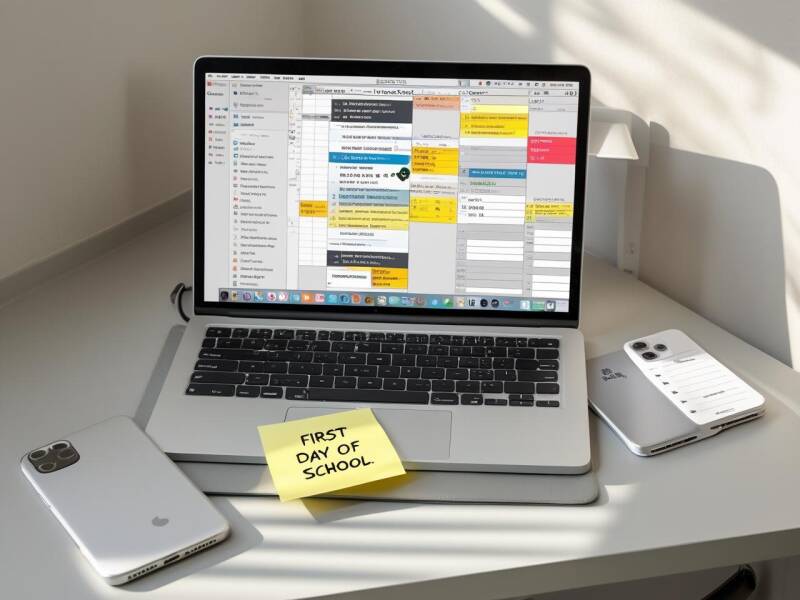As vacations end and routines return, many of us feel an emotional weight we can't quite explain. Here’s why that stress shows up and how to soften the transition back to structure.

The shift is subtle at first. A few more school supply ads. A couple of calendar invites are creeping into the last quiet corners of August. You realize your mornings are starting earlier, your inbox is filling up faster, and the breathing room of summer is closing in.
It’s not burnout exactly. It’s not panic either. But something hums under the surface, tension without a name. That’s "quiet stress", and it often shows up during times like this, when life transitions from open and flexible to scheduled and demanding.
Whether you're a parent coordinating back-to-school routines, a professional returning from vacation into stacked workweeks, or both at once, the emotional toll is real. But because this stress doesn’t yell, it’s easy to ignore. That doesn’t mean it’s harmless.
Let’s talk about how to see it, name it, and soften it, so that the return to structure doesn’t come at the expense of your well-being.
What Is Quiet Stress?
Quiet stress builds slowly. It doesn’t announce itself with breakdowns or emergency alarms. It hides behind responsibilities, small expectations, and daily adjustments. And this time of year? It thrives.
Think of what late July through early September asks of us:
- Parents transition kids back into academic life, often while holding full-time jobs.
- Professionals ramp up workloads as summer PTO ends and team momentum returns.
- Schedules tighten, demands grow, and space to just be shrinks.
You might feel slightly irritable. A little more tired. Slightly overwhelmed but unsure why. That’s the nature of quiet stress—it whispers instead of shouts.



Why the End of Summer Feels Heavier Than It Looks
Culturally, we treat summer as a season of rest, freedom, and ease. Whether or not your summer looked like that, we associate this time with emotional breathing room. So when school starts again, and routines tighten, there’s grief in the shift even if things aren’t objectively “bad.”
People don’t always talk about it, but the return to structure can feel like a loss:
- Loss of spontaneity
- Loss of slower mornings
- Loss of flexibility in how we use our time
And in that loss, stress takes root not loudly, but deeply.
Micro Habits to Ease the Transition
You don’t need a total life overhaul to manage this kind of stress. What helps most is intentional softening. Here are a few small but powerful ways to care for yourself as the season changes:
- Name the Shift
Acknowledge that you’re in transition. Say it out loud:
“This is a hard switch for me. I feel the tension even if I can’t explain it.”
Naming the emotion helps you contain it.
- Shrink the To-Do List
Try limiting your daily goals to three tasks for the first couple of weeks. Be ruthless about what’s essential. The rest can wait. This builds momentum without pressure.
- Create Buffer Zones
Don’t jump from one thing to the next. Add 10–15 minute windows between work meetings or after drop-off before your first major task. Use that time to reset, breathe, and notice how you’re feeling.
- Protect Small Joys
Schedule something simple that makes you feel human each day:
A walk alone. A slow coffee. A playlist that reminds you of summer. These aren’t indulgences; they’re emotional lifelines.
For Parents: Your Calm Matters Most
If you're a parent, your children likely feel their own version of this shift, sometimes with more intensity than words. Your tone, pace, and body language shape the emotional climate of the house. You don’t have to be perfect. But the more regulated you are, the more stability they’ll feel.
Take care of yourself first so you can show up fully for them.
Try This Today
You don’t have to wait until next week. Start easing quiet stress now with one of these:
- Take three full breaths before checking your phone in the morning
- Ask your child (or yourself) one question: What are you feeling about this new season?
- Say “no” to one task, invite, or favor that feels like too much
- Add a 15-minute "nothing" block to your calendar each day this week
Final Thoughts
Transitions always carry weight. But the end of summer tends to pile it on in quiet, persistent ways. You’re not imagining it. And you don’t need to power through it. Give yourself the room to feel this shift, then make space—small, steady space—for ease to return.
The grind may be back, but peace doesn’t have to leave.
What part of this seasonal transition feels hardest for you right now? And what small change might ease the weight?

Add comment
Comments